|
World Population


Between 1960 and 1999, Earth's population doubled from three billion to
six billion people. When population growth is coupled with shortsighted
planning and excessive consumption of resources, problems multiply.
Human pressure on the environment is a product of three factors:
population, consumption, and technology.
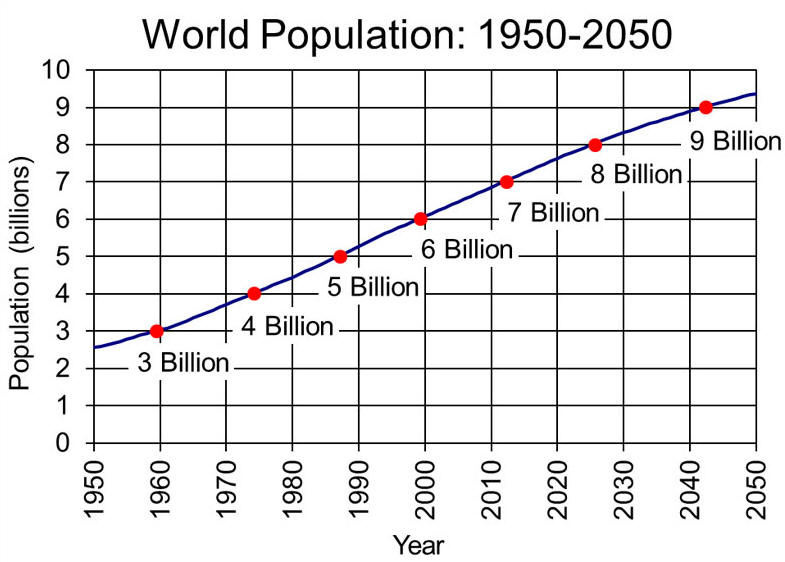
Population is the total number of people, consumption is the amount of
resources each person consumes, and technology is how these resources are
used and how much waste is produced for each unit of consumption.
We have transformed approximately half of The Earth's surface for our own
uses, with widespread impacts on the planet's forests, oceans,
freshwater, and atmosphere.
Some of the issues the world will have to deal with in the next few
decades-
Scarce Water
--- Currently, 434 million people face either water stress or scarcity.
Depending on future rates of population growth, between 2.6 billion and
3.1 billion people may be living in either water-scarce or water-stressed
conditions by 2025.
Scarce Cropland ---The number of people living in
countries where cultivated land is critically scarce is projected to
increase to between 600 million and 986 million in 2025.
Fisheries --- Most of the world 's ocean fisheries are
already being fished to their maximum capacities or are in decline.
Forests --- Today over 1.8 billion people live in 36
countries with less than 0.1 hectare of forested land per capita, an
indicator of critically low levels of forest cover. Based on the medium
population projection and current deforestation trends, by 2025 the number
of people living in forest-scarce countries could nearly double to 3
billion.

October 31,2011-The world's seventh billion person was "officially" born today -
but according to some experts, the UN might have jumped the gun. The US Census
Bureau says the most likely date the world population will reach seven billion
is between March and April next year.
There is a window of uncertainty of at least six months before and six months
after the 31 October for the world population to reach seven billion.
According to the UN's population website, no-one can determine the date with an
error margin smaller than about 12 months, as even the best censuses have
"inevitable inaccuracies". The UN's reason for naming a symbolic date as
seven-billion day is to draw attention to the speed of population growth, with
less than 13 years having passed between the six-billion and seven-billion
milestones.
Since 1968, the population of our world has doubled. However, despite major
declines in the average number of children per women, population growth is
projected to continue at least until the middle of the 21st century. Nearly all
of this population growth will occur in less developed countries, in countries
that already face major difficulties meeting the basic needs of their citizens.
About two billion people, a third of the world's population, lack access to
modern energy sources, including electricity or even fossil fuels. They rely on
firewood or biomass -- crop residues or animal dung -- for cooking, heating and
lighting. About 2.5 million women and children die every year from respiratory
diseases caused by primitive cooking stoves. Many people in developing nations,
especially women, spend long hours searching for firewood, reducing their
chances of education and development. As the population swells, rising demand
for firewood leads to deforestation.
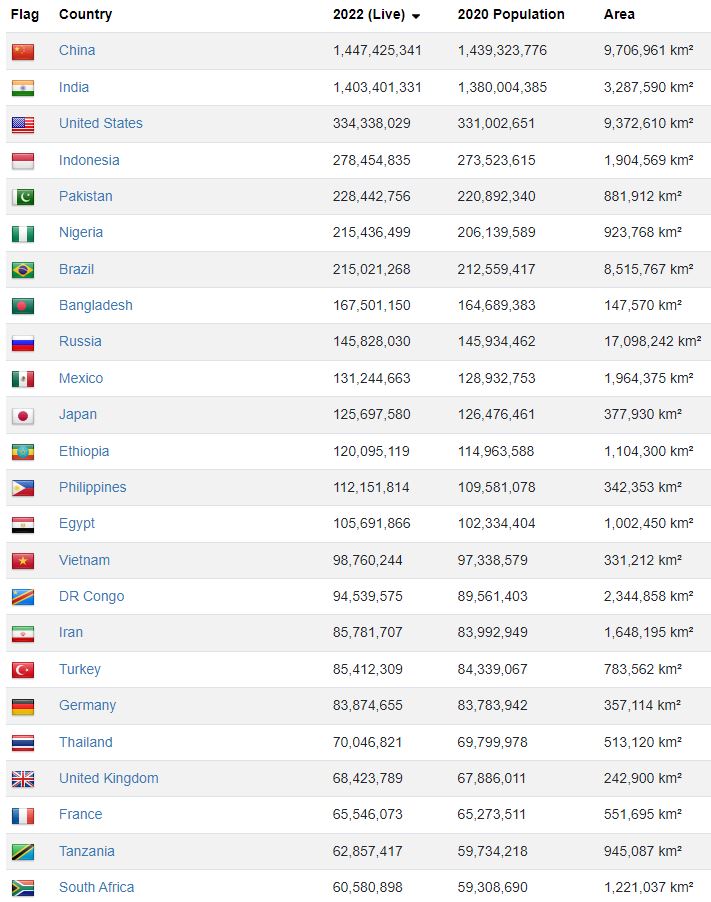
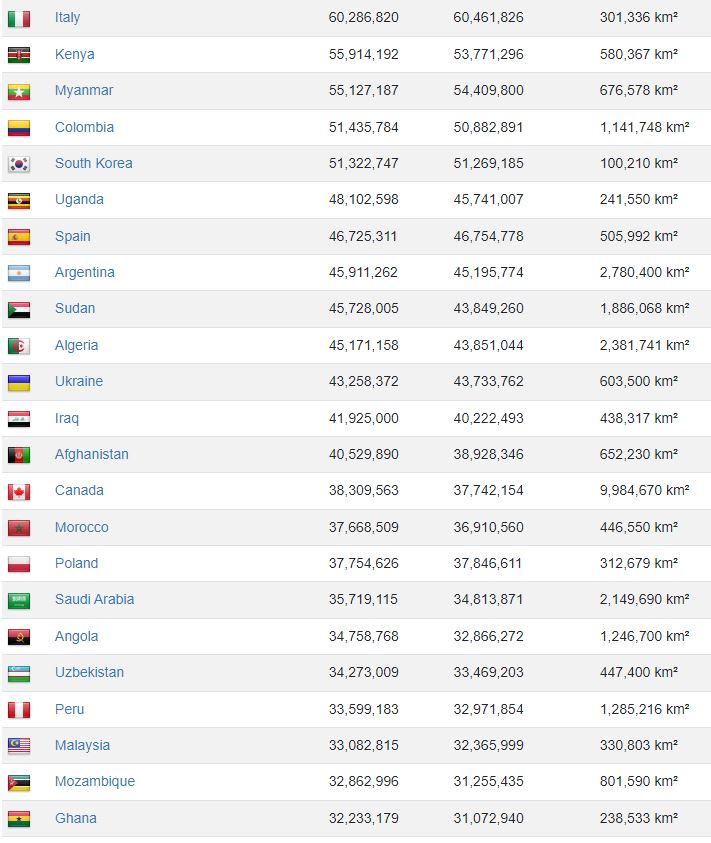
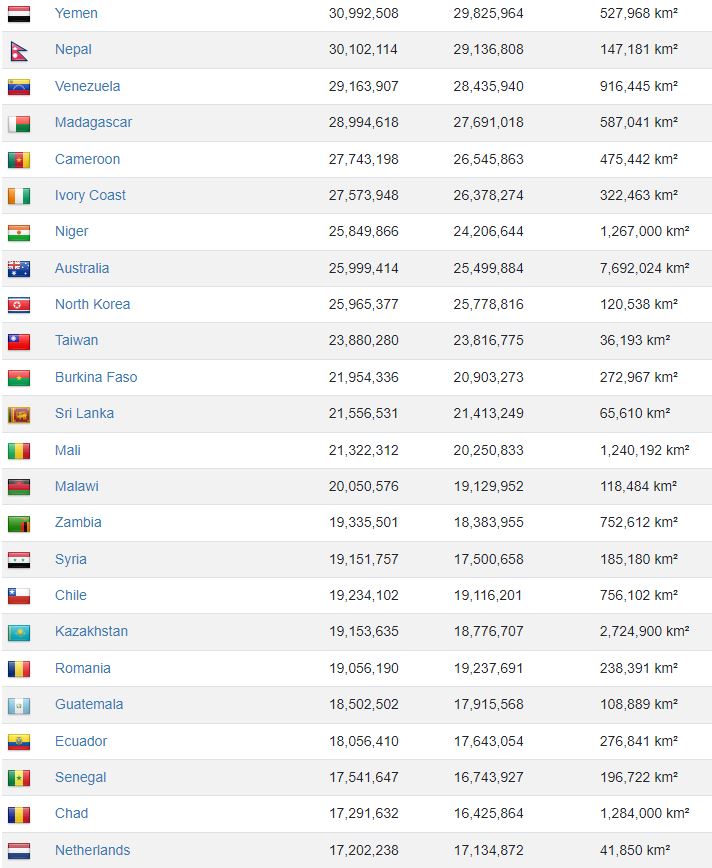
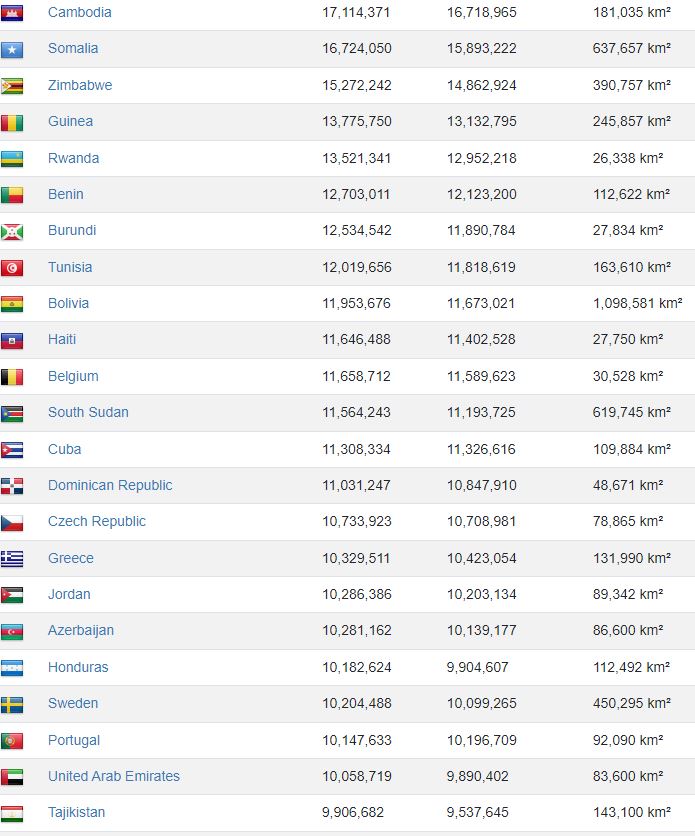
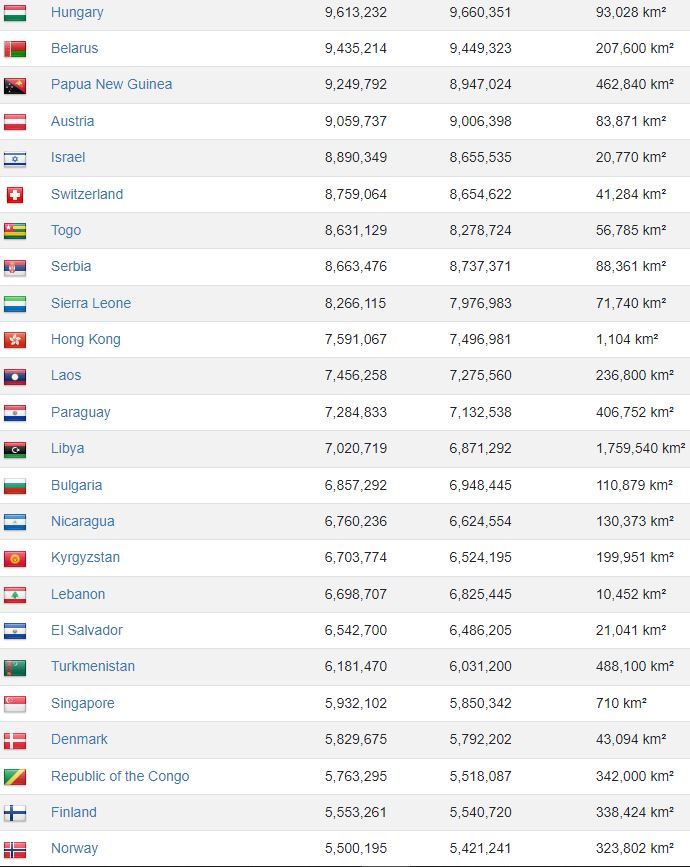
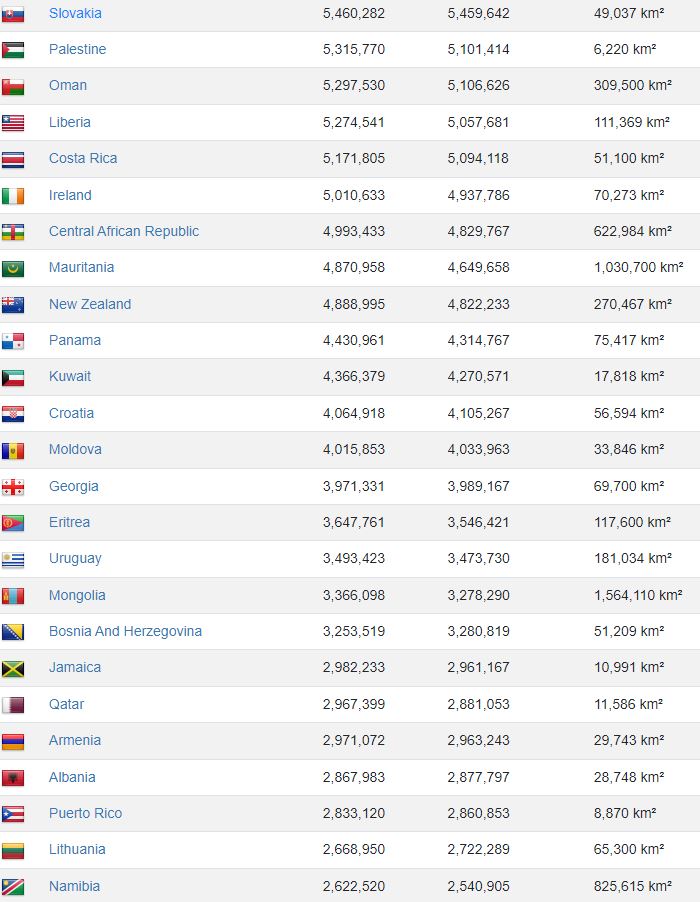
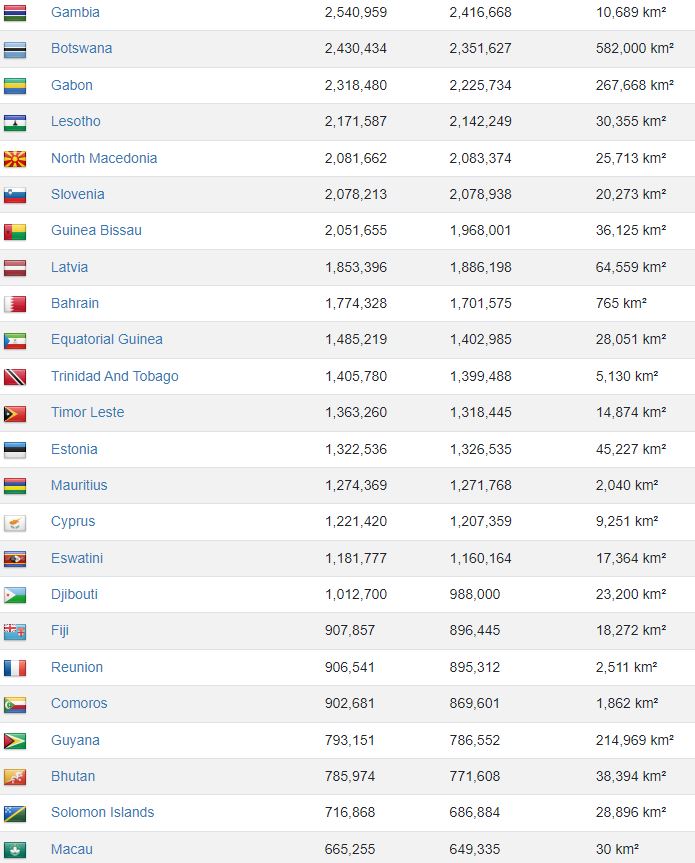
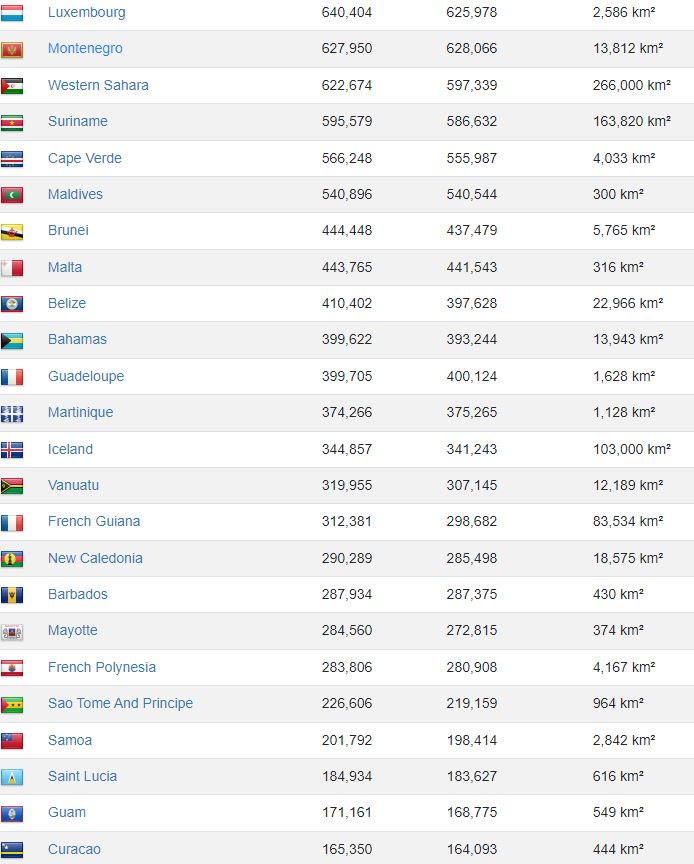
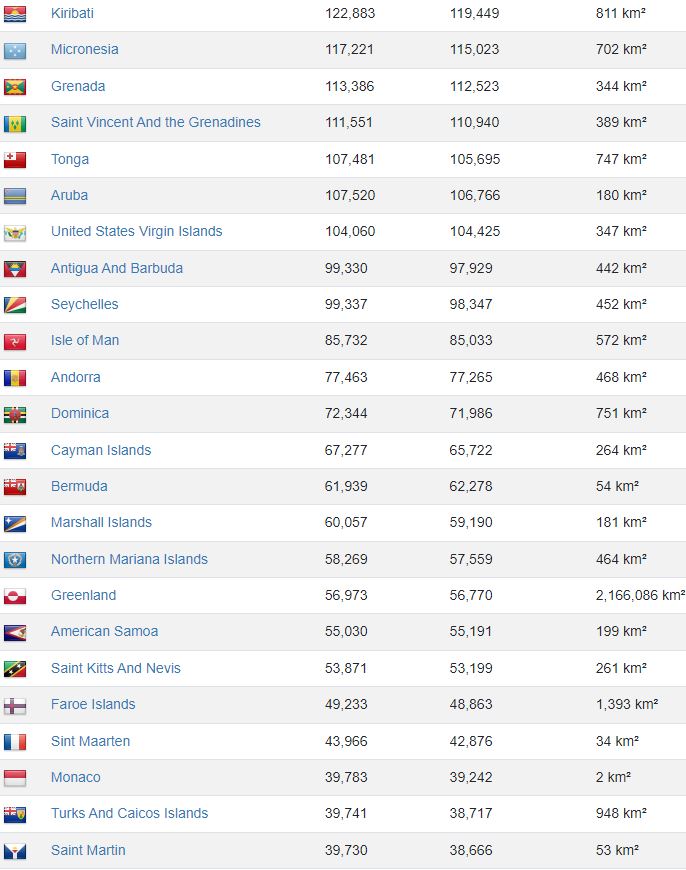
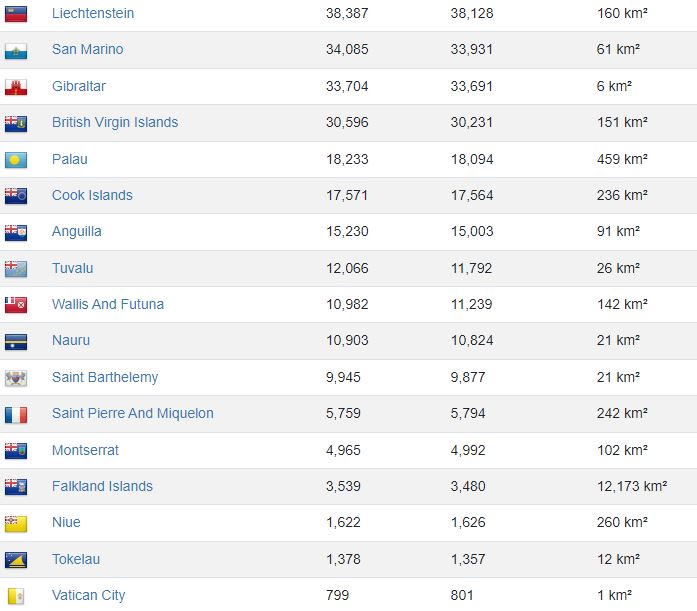
There are 6,800 known languages spoken in the world. 2,261 have writing
systems (the others are only spoken)
Top Languages In the Worlds
| 1 |
Mandarin |
1151 |
| 2 |
English |
1000 |
| 3 |
Spanish |
500 |
| 4 |
Hindi |
490 |
| 5 |
Russian |
277 |
| 6 |
Arabic |
255 |
| 7 |
Portuguese |
240 |
| 8 |
Bengali |
215 |
| 9 |
French |
200 |
| 10 |
Malay,
Indonesian |
175 |
| 11 |
German |
166 |
| 12 |
Japanese |
132 |
| 13 |
Farsi
(Persian) |
110 |
| 14 |
Urdu |
104 |
| 15 |
Punjabi |
103 |
| 16 |
Wu |
90 |
| 17 |
Vietnamese |
86 |
| 18 |
Javanese |
85 |
| 19 |
Tamil |
78 |
| 20 |
Korean |
78 |
| 21 |
Turkish |
75 |
| 22 |
Telugu |
74 |
| 23 |
Marathi |
72 |
| 24 |
Italian |
62 |
| 25 |
Thai |
60 |
| 26 |
Burmese |
56 |
| 27 |
Cantonese |
55 |
| 28 |
Kannada |
47 |
| 29 |
Gujarati |
46 |
| 30 |
Polish |
46 |
In Millions- First and Second Language
How many countries are there in the world?
There may be anywhere between 168 and 257 nations, depending on who is doing
the counting. There are approximately 170 separate currencies, 239 two-letter
country codes recognized by the ISO (International Standards Org.), and the
Universal Postal Union has listings for 500,000 localities in 189 Countries.
1 Afghanistan
2 Akrotiri
3 Albania
4 Algeria
5 American Samoa
6 Andorra
7 Angola
8 Anguilla
9 Antarctica
10 Antigua and Barbuda
11 Argentina
12 Armenia
13 Aruba
14 Ashmore and Cartier Islands
15 Australia
16 Austria
17 Azerbaijan
18 Bahamas, The
19 Bahrain
20 Bangladesh
21 Barbados
22 Bassas da India
23 Belarus
24 Belgium
25 Belize
26 Benin
27 Bermuda
28 Bhutan
29 Bolivia
30 Bosnia and Herzegovina
31 Botswana
32 Bouvet Island
33 Brazil
34 British Indian Ocean Territory
35 British Virgin Islands
36 Brunei
37 Bulgaria
38 Burkina Faso
39 Burma
40 Burundi
41 Cambodia
42 Cameroon
43 Canada
44 Cape Verde
45 Cayman Islands
46 Central African Republic
47 Chad
48 Chile
49 China
50 Christmas Island
51 Clipperton Island
52 Cocos (Keeling) Islands
53 Colombia
54 Comoros
55 Congo, Democratic Republic of the
56 Congo, Republic of the
57 Cook Islands
58 Coral Sea Islands
59 Costa Rica
60 Cote d'Ivoire
61 Croatia
62 Cuba
63 Cyprus
64 Czech Republic
65 Denmark
66 Dhekelia
67 Djibouti
68 Dominica
69 Dominican Republic
70 Ecuador
71 Egypt
72 El Salvador
73 Equatorial Guinea
74 Eritrea
75 Estonia
76 Ethiopia
77 Europa Island
78 Falkland Islands (Islas Malvinas)
79 Faroe Islands
80 Fiji
81 Finland
82 France
83 French Guiana
84 French Polynesia
85 French Southern and Antarctic Lands
86 Gabon
87 Gambia, The
88 Gaza Strip
89 Georgia
90 Germany
91 Ghana
92 Gibraltar
93 Glorioso Islands
94 Greece
95 Greenland
96 Grenada
97 Guadeloupe
98 Guam
99 Guatemala
100 Guernsey
101 Guinea
102 Guinea-Bissau
103 Guyana
104 Haiti
105 Heard Island and McDonald Islands
106 Holy See (Vatican City)
107 Honduras
108 Hong Kong
109 Hungary
110 Iceland
111 India
112 Indonesia
113 Iran
114 Iraq
115 Ireland
116 Isle of Man
117 Israel
118 Italy
119 Jamaica
120 Jan Mayen
121 Japan
122 Jersey
123 Jordan
124 Juan de Nova Island
125 Kazakhstan
126 Kenya
127 Kiribati
128 Korea, North
129 Korea, South
130 Kuwait
131 Kyrgyzstan
132 Laos
133 Latvia
134 Lebanon
135 Lesotho
136 Liberia
137 Libya
138 Liechtenstein
139 Lithuania
140 Luxembourg
141 Macau
142 Macedonia
143 Madagascar
144 Malawi
145 Malaysia
146 Maldives
147 Mali
148 Malta
149 Marshall Islands
150 Martinique
151 Mauritania
152 Mauritius
153 Mayotte
154 Mexico
155 Micronesia, Federated States of
156 Moldova
157 Monaco
158 Mongolia
159 Montserrat
160 Morocco
161 Mozambique
162 Namibia
163 Nauru
164 Navassa Island
165 Nepal
166 Netherlands
167 Netherlands Antilles
168 New Caledonia
169 New Zealand
170 Nicaragua
171 Niger
172 Nigeria
173 Niue
174 Norfolk Island
175 Northern Mariana Islands
176 Norway
177 Oman
178 Pakistan
179 Palau
180 Panama
181 Papua New Guinea
182 Paracel Islands
183 Paraguay
184 Peru
185 Philippines
186 Pitcairn Islands
187 Poland
188 Portugal
189 Puerto Rico
190 Qatar
191 Reunion
192 Romania
193 Russia
194 Rwanda
195 Saint Helena
196 Saint Kitts and Nevis
197 Saint Lucia
198 Saint Pierre and Miquelon
199 Saint Vincent and the Grenadines
200 Samoa
201 San Marino
202 Sao Tome and Principe
203 Saudi Arabia
204 Senegal
205 Serbia and Montenegro
206 Seychelles
207 Sierra Leone
208 Singapore
209 Slovakia
210 Slovenia
211 Solomon Islands
212 Somalia
213 South Africa
214 South Georgia and the South Sandwich Islands
215 Spain
216 Spratly Islands
217 Sri Lanka
218 Sudan
219 Suriname
220 Svalbard
221 Swaziland
222 Sweden
223 Switzerland
224 Syria
225 Taiwan
226 Tajikistan
227 Tanzania
228 Thailand
229 Timor-Leste
230 Togo
231 Tokelau
232 Tonga
233 Trinidad and Tobago
234 Tromelin Island
235 Tunisia
236 Turkey
237 Turkmenistan
238 Turks and Caicos Islands
239 Tuvalu
240 Uganda
241 Ukraine
242 United Arab Emirates
243 United Kingdom
244 United States
245 Uruguay
246 Uzbekistan
247 Vanuatu
248 Venezuela
249 Vietnam
250 Virgin Islands
251 Wake Island
252 Wallis and Futuna
253 West Bank
254 Western Sahara
255 Yemen
256 Zambia
257 Zimbabwe
(Population in millions. When lower and upper estimates are the same they
are shown under "Lower.")
|
Year
|
|
|
Lower
|
Upper
|
|
10000 BC |
1 |
10 |
|
8000 BC |
5 |
|
|
6500 BC |
5 |
10 |
|
5000 BC |
5 |
20 |
|
4000 BC |
7 |
|
|
3000 BC |
14 |
|
|
2000 BC |
27 |
|
|
1000 BC |
50 |
|
|
500 BC |
100 |
|
|
400 BC |
162 |
|
|
200 BC |
150 |
231 |
|
1 AD |
170 |
400 |
|
200 AD |
190 |
256 |
|
400 AD |
190 |
206 |
|
500 AD |
190 |
206 |
|
600 AD |
200 |
206 |
|
700 AD |
207 |
210 |
|
800 AD |
220 |
224 |
|
900 AD |
226 |
240 |
|
1000 AD |
254 |
345 |
|
1100 AD |
301 |
320 |
|
1200 AD |
360 |
450 |
|
1250 AD |
400 |
416 |
|
1300 AD |
360 |
432 |
|
1340 AD |
443 |
|
|
1400 AD |
350 |
374 |
|
1500 AD |
425 |
540 |
|
1600 AD |
545 |
579 |
|
1650 AD |
470 |
545 |
|
1700 AD |
600 |
679 |
|
1750 AD |
629 |
961 |
|
1800 AD |
813 |
1,125 |
|
1850 AD |
1,128 |
1,402 |
|
1900 AD |
1,550 |
1,762 |
|
1910 AD |
1,750 |
|
|
1920 AD |
1,860 |
|
|
1930 AD |
2,070 |
|
|
1940 AD |
2,300 |
|
|
1950 AD |
2,400 |
2,557 |
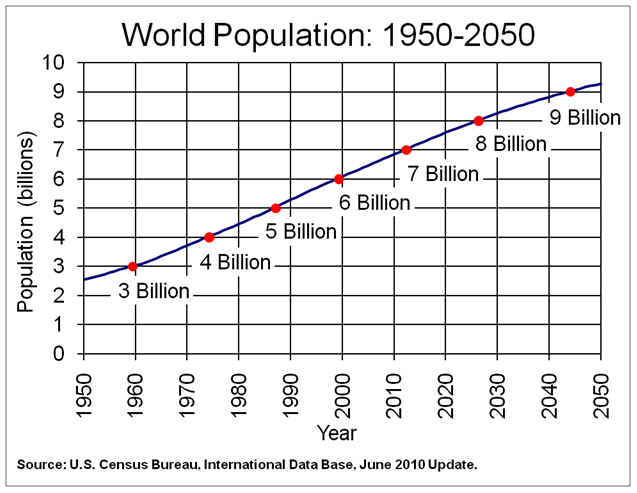
Credit: U.S. Census Bureau,United Nations
|






